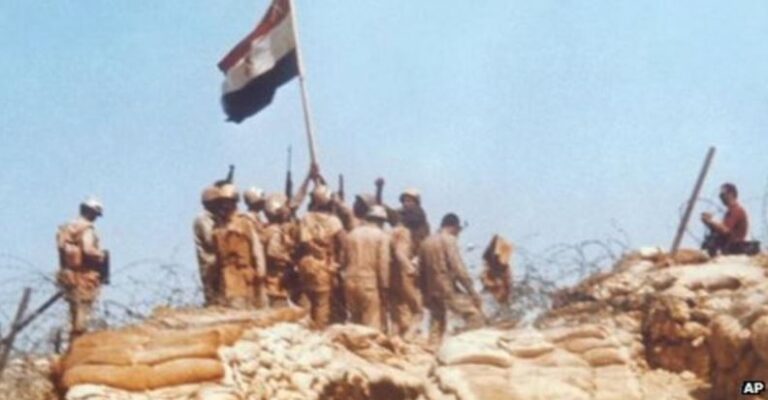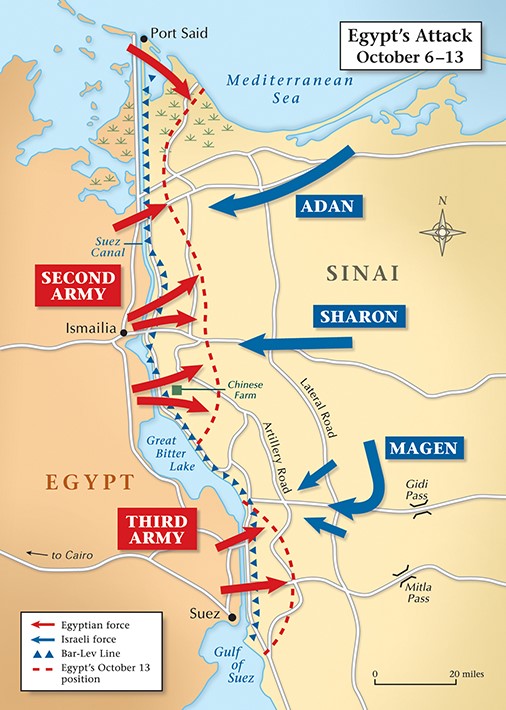The Enduring Lesson of 1973
In October 1973, we Ammanis covered our car lights in a deep indigo dye. It was a time of war, so we were advised to brownout for a couple of weeks. The Egyptian and Syrian armies had just launched a joint surprise assault against Israel. Jordan did not participate in the war, but we were told to brownout, and brownout we did.
I don’t remember having a sense of dread. I was still very young, but, like many in my generation, I had internalized our chronic jitters as, paradoxically, a normalcy of Arab life. We had already experienced the 1967 Arab-Israeli War, Jordan’s 1970 Civil War, and numerous other episodes that signaled things were less than well. That was just the way it was. Fatah and other Palestinian factions, like the Palestine Front for the Liberation of Palestine (PFLP), were on the rise, and the skies and borders were constantly agitating in the Levant.

We call it the October War, Israelis the Yom Kippur War. The standard tale is this: the Egyptian- Syrian campaign was very smart and the armies fought very well; the Israelis were caught off guard and glaringly ill-prepared. They were in retreat, were taking very heavy casualties, and required an immediate and major American airlift. President Richard Nixon and Secretary of State Henry Kissinger obliged, of course, and operation Nickel Grass was launched. Israel then regrouped and reimposed the status quo shattered by Egypt and Syria. Verdict? A very embarrassing loss for the Israeli state, a big victory for us. Rarely do Arabs and Israelis agree on interpretations of events, but we agree on this one.

Psychology is queen. Now Sadat was ready to negotiate his way to Jerusalem in 1978 and change the topography of the Arab-Israeli conflict. All that, as they say, is history–and not the most interesting part, frankly. The fine details that compose the story of the October War are, in fact, no less fascinating than 1967’s. And the finest detail of them all is about how well the Egyptian army was actually performing, and how Sadat, at the most critical moment on the battlefield, forced it to cede its clear strategic advantage.

What this actually meant is that in 1973, only six years after the catastrophic Egyptian defeat, the Egyptian army was able to reorganize, rebuild, rearm, retrain, and execute a very impressive attack plan against Israel. So was the case with the Syrian army. No scholar tells this story better than Hazem Kandil in Soldiers, Spies and Statemen, a meticulously researched account of how Sadat denied his military, his country, and his Syrian partners an arguably shapeshifting outcome in the historic struggle between us and Israel. Not only that, but how he proceeded, in the ensuing negotiations, to concede much more than he was ever expected or asked to by none other than Kissinger himself.
The 1973 was, indeed, a turning point, but it would have been potentially a much more consequential one for the Arab-Israeli debacle had Sadat not had other ideas up his sleeve. A big what if, that, but one that can rely on much support from historical evidence.
Does any of this matter now? I think so. Anniversaries commemorate more than the event itself. They tend to conjure the mood and emotions of the period, the collective mindset, if you will. It’s always instructive to see which convictions that resided in us then have left and which have stayed.
And the one conviction that has, tellingly, outlasted its companions is the futility of the fight and the wisdom of submission. The construct was simple: that Israel was too powerful; that even if it could be militarily beaten, the US would never allow it; that Arab countries were simply too backward and Israel too advanced economically, technologically, and militarily. There was more than a grain of truth in the construct, of course. But ingeniously, it was made to have the air of inevitability about it. It all seemed foreordained, written in the stars. Our lot, like it or not.
That’s what my generation grew up on, and that’s what many of us came to firmly believe, even though, ironically, the struggle has always been more nuanced in reality. The October 1973 War was just one example of the fallacy of the irrefutable superiority of Israel and the manifest inferiority of us–of the inevitability of defeat, or worse, of the pointlessness of victory. It was never the neat either/or we were conditioned to embrace.
This mindset has taken a serious beating in recent years, most memorably in 2000, when Hezbollah forced Israel to withdraw from southern Lebanon after an 18-year-long occupation. Moreover, the battlefield today is not the conflict’s only arena. Ours is a much more complicated regional landscape, in parts absolutely disheartening, in others encouragingly fluid.
Does any of it matter now? Surely, you are watching as Gaza adds the latest edit to this endless saga. In spite of the remarkable geopolitical transformations that are remaking the very shape of the region, the Palestinian cause remains very vibrant and so does its chronicle of pain.
Palestinian paragliders enter Israel
****
On Another Note
In September, Chileans, commemorated the 1973 coup that ushered out the democratically elected Salvador Allende and ushered in General Augusto Pinochet. The debate still rages between the supporters of this man and that, inside Chile and out. We know much today that was not known then, and it all still fascinates and, yes, resonates.
Here’s is The Rest Is History Podcast on the coup, in two episodes. Historians Tom Holland and Dominic Sandbrook are as feisty and funny as they are serious.
Have a listen, because it’s bloody interesting.
